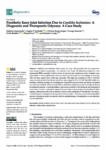Prosthetic Knee Joint Infection Due to Candida lusitaniae: A Diagnostic and Therapeutic Odyssey: A Case Study
Prosthetic joint infections (PJIs) caused by fungi, although relatively rare, represent a major surgery-related complication. An extremely rare fungal PJI, following revised total knee replacement (TKR) caused by Candida lusitaniae, is reported, and a meticulous review of similar cases is provided. A 74-year-old female, who underwent primary total knee arthroplasty 10 years ago and a revision surgery three weeks ago, presented with signs and symptoms of PJI. C. lusitaniae was eventually isolated from the periprosthetic tissue using the MALDI-TOF VitekMS-bioMérieux technique. Multiple strategies for managing this fungal PJI were performed, and finally, the patient was treated successfully with an intramedullary arthrodesis system and proper antifungal treatment, including fluconazole. A multidisciplinary approach is essential for the diagnosis and treatment of such severe infections. In persistent cases and in cases where revision surgery is extremely difficult to perform, arthrodesis seems to be an effective solution for the elimination of the infection. The efficacy of the therapeutic management of fungal PJIs remains unclear. Therefore, more research should be reported, focusing on proper treatment so that the optimal strategy in treating these severe infections may be established.



